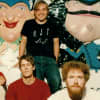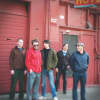Yesterday, Matador Records released the expanded edition of Brighten the Corners, Pavement's fourth album. We covered some of the story behind the album for the Reheaters column in the new issue of The FADER. For that piece we talked to Mitch Easter, the producer of the early albums by R.E.M. (among others), who engineered Brighten the Corners at the studio he had in his Athens, Georgia home. Easter gave us a great interview, but due to cursed word count limitations, didn't make it into the final article. So instead, here it is, on the web!
How did you got involved with making Brighten the Corners?
Somebody called me. I don’t even know who it was. It was one of the guys in the band. They had gotten together at Steve [West]’s place in Virginia to practice, which for them was a sort of radical move—to get together ahead of time and work the songs out. Traditionally they didn’t do that. [West] lives in this big old house, this big late 1800s kind of house, and somehow they knew that my house was similar. Around the same time as that record I moved my studio stuff inside my house, which I only did for a few years. They wanted to keep the vibe going. It was on sort of a whim. I guess they did a lot of things by that kind of reasoning. It was really Bryce Goggin’s session. He had worked with them before. They were using my place, but Bryce was really the guy doing the session. I helped them get going and worked on the set up. That was really my role, but then after a week or so, Bryce had to leave for some reason, so I ended up being the only guy working with them for about a week.
Was it recorded in just two weeks?
Well, no. What they did here was the music, basically. I think all the vocals were recorded in New York. When they were here, [Stephen Malkmus] was just singing scratch vocals and scratch words and sometimes not even words. I don’t think he had written words, so that all happened after they left here. They also mixed it in New York. They probably worked for another week and a half or two weeks, probably.
Were you familiar with their music before they approached you?
Yeah, but I wasn’t an expert, which I’m still kind of embarrassed about. I didn’t have the whole catalog by any means. I really, really like Brighten the Corners. They had a great way of working, which was quasi-jamming but not just pure jamming. They would just play together on a song that everybody kind of had an idea what the chorus was, but every time they played it, it had a different feel. Things changed a lot from one time to the next and the idea was that you just recorded everything and they would just pick the good one and that became the version. When you buy a record, you just get so used to it and sometimes it’s hard to imagine how a song can be done any other way, but if you heard all the session tapes from this one, it’s really remarkable how big the shift was on every take. There was a lot of editing. There was a lot of going back through the tapes and taking stuff out. To some extent, they would cut the tape up and make a composite take out of multiple rounds. It was a very cool way of working because it was so loose and at the same time it was really confident. There’s a way to do that where you’re sort of lost, but they weren’t lost at all. They were veterans at making records and they were smarts guys, so they knew what they were doing. Compared to the average rock session, which is sort of a grind, just working really hard to not fuck up, that wasn’t their method at all. It was way freer and just great. Usually it’s one extreme or another. Usually it’s just totally noodling jamming or it’s just really structured, and they were just right in the middle.
Have you ever worked with another band that was anything like that?
Not really. Most bands are just so worried about the money. They basically can’t afford to do that. They feel like that they got to have their stuff together before they come in and that’s usually the best thing to do. Not everybody can do what those guys did. They had to learn how to work like that. Other people are often really concerned about this perfect version, like it’s almost like written in sheet music or something, that’s not the kind of perfection that they were looking for. They were going for just a feel. They didn’t go back and fix one note like most bands do. They either liked it in big, broad strokes or they didn’t. In the end, it was as fast as anybody ever works even though they were kind of making it up as they went.
You said that different takes would be radically different from each other. Do you think that they usually made the right choice?
That’s a good question because I don’t really remember now. As soon as it was edited together, we got used to it and it always sounds right. I do think that they did pick the right stuff. It’s really hard to say what these differences were. It wasn’t like, All right guys, now let’s try it with a reggae feel. The speed would change and just everything would just sort of change
You usually work as a producer, how was it working mainly in an engineer capacity?
The whole thing of being a record producer has never really interested me very much. I know how to do it, sort of, whereas some people really want to be record producers. I’ve done this stuff forever. I just wanted to make records in whatever capacity was needed. For me, the most fun is working with bands like [Pavement] where they really have a lot of ideas. If somebody says, “I got this chord progression, can you help me turn this into a finished track?” I can do that, but working with people like them is fun because everybody is talking and everybody is throwing stuff down and you don’t even remember who said what, and in the end, you just have this great thing. With those guys, I definitely felt that my role was not to be a record producer. At the same time, I was welcomed to pipe up and say anything. They were totally cool about it.
After this experience, did you start listening to their stuff more?
Yeah. I’m never really that deliberate about my record listening, but I have since heard a lot more of their stuff. They had a lot of periods in their career. I guess Slanted and Enchanted is the one that people still probably like the best, isn’t it? I think Brighten the Corners has done pretty well and people seem to like it well too. It’s interesting for me though, I had a tape of that stuff without words. It was really fun to listen to. It was like a totally different record. It’s almost like two separate LPs, even though they’re the same tracks.
Have you seen what’s going to be on the reissue?
I don’t know anything about it. The first I’ve heard about it is this interview. It’s funny because I felt kind of weird about the fact that I didn’t really work on that record on any kind of huge capacity, but I think when it came out, my name floated around for a little bit. Nobody really heard of me much around that time, but at the same time, there were still people that remembered me from a few years before and I got all this press for the record. And I didn’t deserve it. It’s Bryce’s baby. I felt kind of embarrassed about that. I think the New Yorker magazine mentioned me and said that I produced it, which is just wrong. I don’t remember what the credits are, but that was a very much band-produced record, if not a co-production between them and Bryce. That was an example of how beloved they were. They really did get people’s attention and it definitely did get people to start calling me again about recording them.


